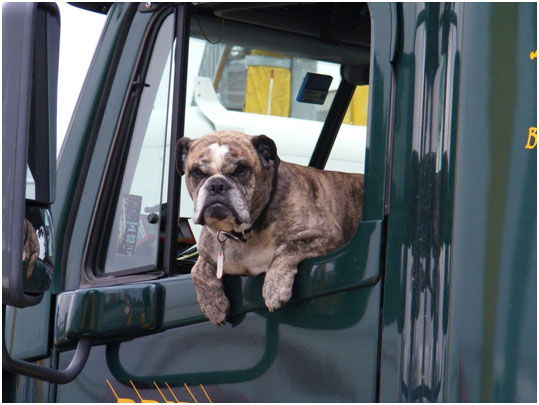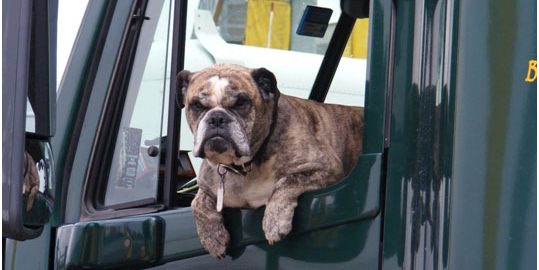Trucking is a rewarding career, but even veteran drivers look for ways to fill lonely hours away from home.  Many opt for the companionship of a pet. It takes a special kind of animal to adapt to the trucking life. Drivers who travel with their pets say they are happier and more focused with their furry friends along for the ride.
Many opt for the companionship of a pet. It takes a special kind of animal to adapt to the trucking life. Drivers who travel with their pets say they are happier and more focused with their furry friends along for the ride.
Health Benefits of Animals and Trucking
Owning a pet can boost both mental and physical health. Drivers report feeling more at peace in lousy traffic situations and other stressful situations when a pet is present. Centers for Disease Control (CDC) findings back that up. The agency reports that pet owners have lower blood pressure, triglyceride, and cholesterol levels – all significant factors in heart health. Pet owners also report reduced feelings of loneliness.
Mayo Clinic notes that excessive sitting – including behind the wheel – raises the risk of cardiovascular disease, blood sugar issues, and cancer. The good news is even moderate exercise considerably reduces these risks. Since pets require bathroom breaks every couple of hours, truckers with pets get more exercise. The rest stops give both the driver and their animal a chance to stretch and move, breaking up an extended trip into shorter quiet periods.
Increased Safety for Truckers with Pets
Bringing a pet along for the ride provides more than health and mental wellness. Female drivers seem to prefer dogs because of the added security they offer. Some animals are big enough to pose a threat to intruders while others serve as pint-sized alarm systems. Drivers are not the only ones who recognize the security a pet offers. If your dog travels with you full-time and alerts you to threats, your pet care expenses may be tax deductible.
Company Requirements for Truckers and Pets
Not every carrier will allow pets; therefore, check the company’s policy before signing on. Most pet-friendly carriers require a pet deposit. The amount ranges from $200-$600, depending on the size, breed, and type of animal. Several carriers impose weight and breed restrictions; most will not allow exotic animals.
Keep proof of up-to-date vaccinations and pet health records with you. Even if the carrier does not require it, you may need the information to cross state lines with your animal. Some states require a current Certificate of Veterinary Inspection (CVI) or another health certificate for your pet. The CVI must be issued by a vet in your home state within the past 30 days. Pre-plan to avoid expensive delays.
Customer Regulations< br />
Some customers have strict guidelines regarding animals on the premises. Food and medication facilities may ask that your pet remains in the truck or off-site. Talk to your dispatcher or supervisor before each trip to ensure a smooth ride.
Pet Care on the Go
There are several considerations for pets and drivers on the road. Food and water, health care, and mental health are primary concerns for pets who spend long hours in a truck.
Food and Water< br />
Keeping fresh food and water on hand is vital to your pet’s health. Consider feeding fresh food whenever possible. Investing in high-quality food helps maintain digestive health and reduce bathroom accidents. Many drivers with truck pets recommend carrying plenty of bottled water. The water available at fuel islands is not always safe to drink.
Health Care< br />
Make and keep regular veterinary appointments for your pet. This ensures vaccinations are up-to-date and helps you stay on top of potential health problems. It is also a good idea to locate several emergency pet care locations along each trip route. Consider purchasing a pet health insurance policy that covers emergency care.
Mental Health< br />
Big rig cabs do not offer a lot of room to move and play. Regular exercise and mental stimulation keep pets healthy. Have several toys on hand and rotate through them to keep your companion animal entertained. Use toys to target specific pet needs. Dogs instinctively chew things; provide safe alternatives to your logbook or CB radio.
Keep a scratching post handy for cats to keep upholstery from being shredded.
Not every animal is suited to life on the road. Some pets cannot deal with tight spaces, long hours or being alone. In these cases, it is kinder to leave them home with family members or find a new home for them.
Tips for Trucking with Animals
Use these tips to create a safe, loving environment for your pet.
- Big animals have little room to move inside a truck. Pets under 25 pounds adapt easier to a life of travel.
- Keep a crate handy with comfortable bedding inside. It is a safe place for a frightened animal to calm down. Some shippers require crates for animals on their property.
- Empty trucks quickly become ovens in summer and freezers in winter. Anti-idling laws do not make exceptions for pets. Make sure your animal will be safe and comfortable before leaving them alone in the truck.
- Block off access to foot pedals while driving. Leaving this area open is distracting and dangerous for both you and your pet.
- Dogs need a bathroom and exercise break every 2-3 hours. Cats can use a litter box, but odor control can be an issue. Use odor-reducing litter and scoop frequently.
- Use a harness or tethered crate to secure pets riding in the front seat. Animals need seatbelts too.
- Take enough food and medication along for each trip. Carry extra water for emergencies.
- Use a leash to keep your pet close when you both leave the truck. Pick up waste, and do not allow your pet to use the bathroom where others might step in it.
Road pets do require extra work, but their owners say they are well worth it. Know the challenges you will face and plan accordingly. With a little forethought, life on the road can be enjoyable for both of you.


